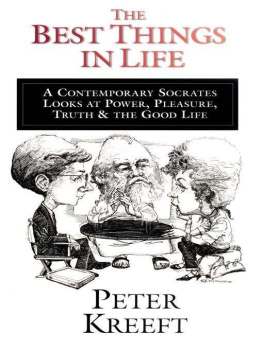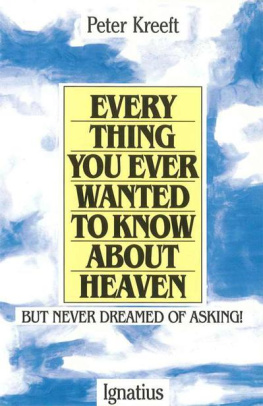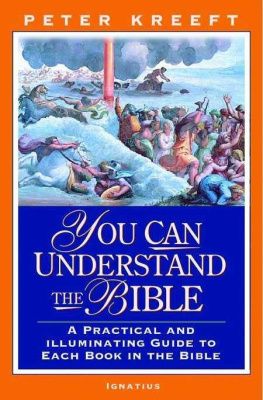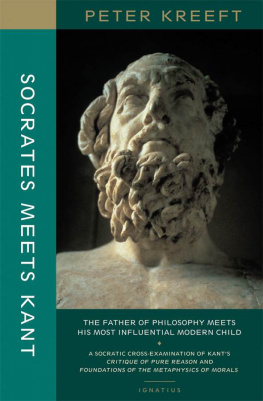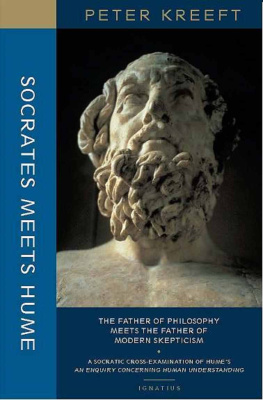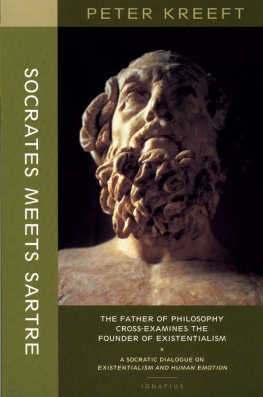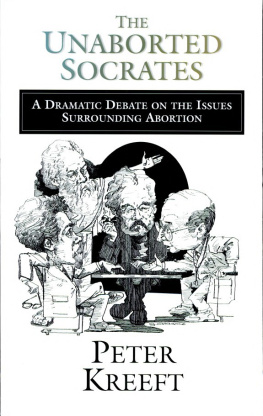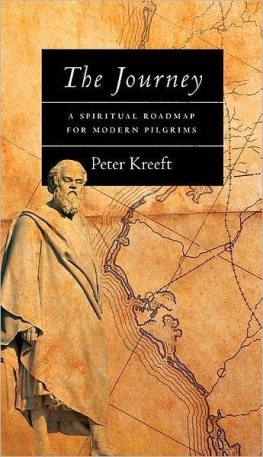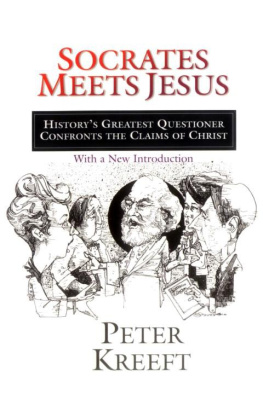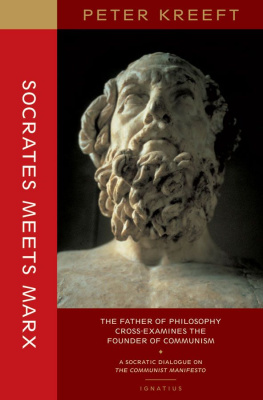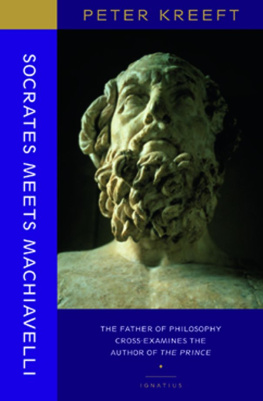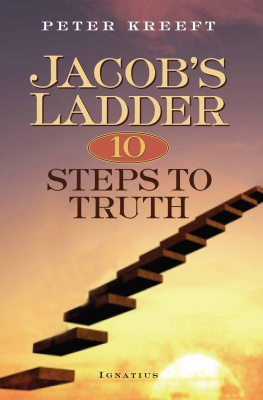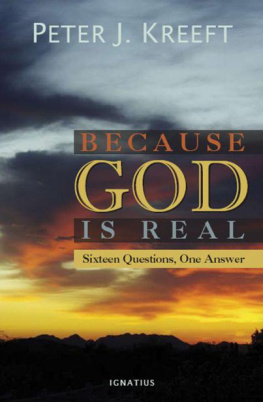Table of Contents
Other books by Peter Kreeft:
C. S. Lewis (Eerdmans, 1969)
Love Is Stronger Than Death (Harper & Row, 1979)
Heaven: The Hearts Deepest Longing (Harper & Row, 1980)
Everything You Always Wanted to Know about Heaven... But
Never Dreamed of Asking (Harper & Row, 1982)
Between Heaven and Hell (InterVarsity Press, 1982)
The Unaborted Socrates (InterVarsity Press, 1983)
1984 by Inter-Varsity Christian fellowship of the United States of America
All rights reserved No part of this book may be reproduced in any form without written permission from InterVarsity Press, P.O Box 1400, Downers Grove, IL 60515
lnterVarsity Press is the book-publishing division of InterVarsity Christian Fellowship , a student movement active on campus at hundreds of universities, colleges and schools of nursing in the United States of America, and a member movement of the International fellowship of Evangelical Students. For information about local and regional activities, write Public Relations Dept., InterVarsity Christian Fellowship, 6400 Schroeder Rd , P.O Box 7895, Madison, WI 53707-7895
Cover illustration. Joe DeVelasco
ISBN 0-87784-922-6
Printed in the United States of America

Library of Congress Cataloging in Publication Data
Kreeft, Peter.
The best things in life.
1. College students Conduct of life Miscellanea.
1. Title
BJ1661 K68 1984 170.44 84-6697
ISBN 0-87784-922-6
20 19 18 17 16
05 04 03
For Jim Sire,
Socrates to my Socrates
Preface
What is the old Greek philosopher Socrates doing on the campus of Desperate State University? you may ask. And how did he get there? And is this the real Socrates or only an imitation?
The answer to the first question is clear: Socrates is doing at Desperate State just what he did in Athens: being Socratic. Even death did not change Socrates; his philosophizing was indeed, as he hoped, a rehearsal for dying. How many of us have such job security even after death? In his Apology Socrates expressed his hope that he would be allowed to go on cross-examining people even after death. Here he gets his wish.
As to the second question, how he got here, I have no idea. I awoke one morning with my head full of Socrates and I cannot shake him loose from any place I go, especially my place of work. You see, I am a college philosophy teacher. Socrates would probably call me an intellectual prostitute, a Sophist, since I get paid for it. Imagine selling wisdom for a fee!
Finally, as to the third question, is this the real Socrates or only an imitation? Only you, the reader, can judge that.
However he got here, here he is, the wonderful troublemaker, the gadfly of Athens who makes difficulties everywhere, especially where life is too easy for thought or thought too easy for honesty. Here he is, the philosopher without a system, the question-wielding swordsman of the mind, the one infected by the oracles puzzle, spreading his good infection, questioning, under the conviction that the unexamined life is not worth living.
Peter Kreeft
Boston College
Foreword
by Anytus of Athens
I dont know why they let me write this foreword, because Im going to tell you why not to read this book. This is a warning. If you know whats good for your society, you will throw this book into the fire and bomb the publishing plant.
I know this fellow Socrates. I have had dealings with him before. I was one of the three who tried to save our beloved Athens by getting Socrates executed. But it was too late.
This man may seem to you a harmless crank, even a wise man, perhaps; but he can tear down a whole society, I assure you. He did it to ours. He taught us to question our old gods, the foundation of our state. He will pull down yours, too, if you listen to him. This very book dethrones the two great gods of your society, Power and Pleasure, and puts in their place only a vague, invisible deity Socrates will not even name.
I remember he used to speak of this unknown god in Athens. We worshiped many gods, but not Socrates. We named many gods, but not Socrates. We accepted our traditions un questioningly, but not Socrates. He even once sculpted a pedestal without a statue and cut the inscription to the unknown god. (He was a stone-cutter.) It was the very inscription that rabble-rouser Paul of Tarsus referred to when he preached to the philosophers on Mars Hill, where the statues of the gods stood.
You may have read that story in your ScripturesActs 17. Paul connected his God and Socrates god this way: he said, the god you worship in ignorance I now declare to you. It was the same God, the destroyer of secular utopiasyours as well as ours. Pauls was the final step in tearing down our statethe Christian infectionbut Socrates prepared the downfall with his first step. Socrates questioned the old gods; Paul introduced the new God. If Socrates had not dethroned the old, there would have been no searching, no room for the new. I warn you, he will do the same thing to you.
I.
SOCRATES AND PETER PRAGMA
1 On Education and E.T.
Socrates: Excuse me for bothering you, but what are you doing?
Peter Pragma: What kind of silly question is that? Im reading a book. Or was, until you interrupted me. Cant you see that?
Socrates: Alas, I often fail to see what others see, and see things others cannot see.
Peter: I dont get it.
Socrates: I saw you holding the book, yes, but I did not see you reading it.
Peter: What in the world are you talking about?
Socrates: You are holding the book in your hands, arent you?
Peter: Of course.
Socrates: And I can see your hands.
Peter: So?
Socrates: But do you read the book with your hands?
Peter: Of course not.
Socrates: With what, then?
Peter: With my eyes, of course.
Socrates: Oh, I dont think so.
Peter: I think youre crazy.
Socrates: Perhaps, but I speak the truth, and I think I can show you that. Tell me, can a corpse read?
Peter: No ...
Socrates: But a corpse can have eyes, cant it?
Peter: Yes.
Socrates: Then it is not just the eyes that read.
Peter: Oh. The mind then. Are you satisfied now?
Socrates: No.
Peter: Somehow I thought youd say that.
Socrates: I cannot see your mind, can I?
Peter: No.
Socrates: Then I cannot see you reading.
Peter: I guess you cant. But what a strange thing to say!
Socrates: Strange but true. Truth is often stranger than fiction, you know. Which do you prefer?
Peter: You know, youre stranger than fiction too, little man.
Socrates: Thats because Im true too.
Peter: Who are you, anyway?
Socrates: I am Socrates.
Peter: Sure you are. And Im E.T.
Socrates: Im pleased to meet you, E.T.
Peter: My name is Peter Pragma.
Socrates: Do you have two names?
Peter: What do you mean?
Socrates: You said your name was E.T.
Peter: And you said your name was Socrates.
Socrates: Because it is. I have this strange habit of saying what is.
Peter: What do you want from me?
Socrates: Would you let me pursue my silly question just a moment longer?
Peter: I thought you got your answer.

